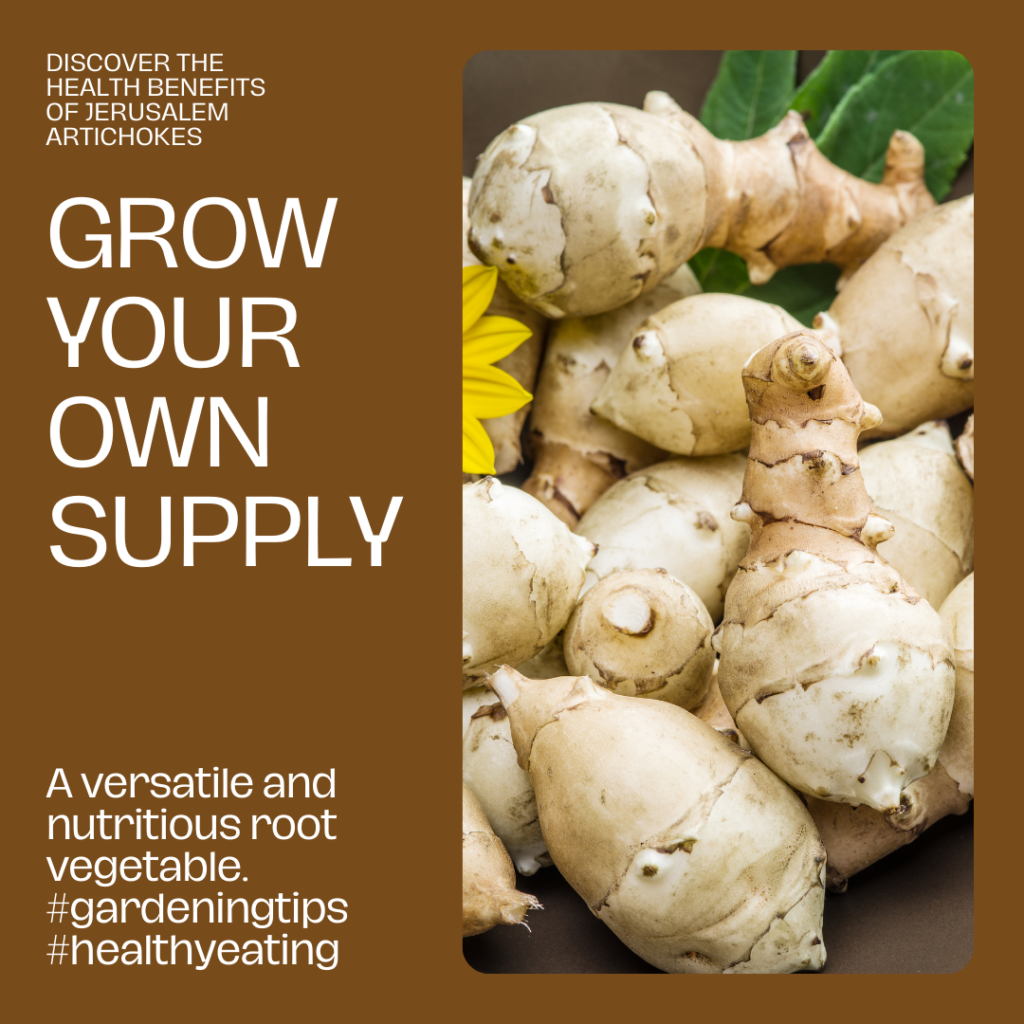
Have you ever heard of Jerusalem artichokes? These unique vegetables offer various health benefits and can be easily grown in your own kitchen garden. In this article, we’ll explore the many reasons why you should consider adding Jerusalem artichokes to your diet and provide you with simple instructions on how to grow your own supply.
Key Takeaways
- Jerusalem artichokes offer many health benefits and are easy to grow in a home garden.
- They are packed with essential nutrients and are an excellent source of dietary fiber.
- Jerusalem artichokes can promote digestive health and help regulate blood sugar levels.
- Growing Jerusalem artichokes requires well-drained, fertile soil and plenty of sunlight.
- Jerusalem artichokes can be used in a variety of recipes and offer a unique, nutty flavor.
Introduction to Jerusalem Artichokes
If you’re looking to add a new and unusual vegetable to your garden, Jerusalem artichokes are a great choice! Also known as sunchokes, Jerusalem artichokes are a member of the sunflower family and originate from North America. Despite their name, Jerusalem artichokes have no relation to Jerusalem or artichokes, but rather gained their name from the Italian word ‘girasole,’ meaning sunflower.
These root vegetables have a unique flavor that’s different from most other root vegetables, with a nutty and slightly sweet taste. Not only are Jerusalem artichokes delicious, but they also offer several health benefits. Rich in vitamins, minerals, and fiber, they’re an excellent dietary addition for those looking to boost their health.
Curious to learn more about this fascinating vegetable? Check out the table below for a quick overview:
| Common name | Jerusalem artichoke or sunchoke |
|---|---|
| Scientific name | Helianthus tuberosus |
| Origin | North America |
| Taste | Nutty, sweet, and slightly crunchy |
| Appearance | Knobby and irregular shape, similar to ginger root, and covered in thin brown skin |
| Nutrition | High in fiber, potassium, iron, and thiamine |
| Health benefits | May improve gut health, aid in digestion and provide cardiovascular benefits |
Nutritional Value of Jerusalem Artichokes
A colorful plate filled with sliced Jerusalem artichokes, surrounded by a variety of other vibrant vegetables and fruits. Rays of sunlight beaming from the top of the plate, highlighting the natural glow of the food.
Jerusalem artichokes are a great addition to any healthy diet, as they are packed with essential nutrients and bring a wealth of health benefits. One cup of cooked Jerusalem artichokes contains:
| Nutrient | Amount |
|---|---|
| Calories | 103 |
| Protein | 3 grams |
| Fiber | 2 grams |
| Vitamin C | 10% of the daily value |
| Potassium | 12% of the daily value |
| Iron | 4% of the daily value |
Source: USDA FoodData Central
The high levels of iron in Jerusalem artichokes make them an excellent vegetable for vegetarians and vegans who are looking to boost their iron intake. In addition, the high fiber content promotes healthy digestion and can help regulate blood sugar levels. The potassium content in Jerusalem artichokes can also help keep your heart healthy.
But that’s not all – Jerusalem artichokes are also rich in inulin, a type of dietary fiber that acts as a prebiotic, promoting the growth of beneficial gut bacteria. Inulin has also been shown to have a positive impact on blood sugar control.
Did you know? In the 17th century, Jerusalem artichokes were a popular crop in Europe because they were easy to grow and quickly became a staple food. But they eventually fell out of fashion, probably due to their knobbly appearance, and were replaced by potatoes.
Incorporating Jerusalem artichokes into your diet is an easy way to increase your nutrient intake and benefit from their many health-promoting properties. In the next section, we’ll explore the digestive health benefits of Jerusalem artichokes in more detail.
Digestive Health Benefits
If you’re looking to improve your digestive health, Jerusalem artichokes are an excellent addition to your diet. These root vegetables are packed with inulin, a dietary fiber that promotes the growth of beneficial bacteria in your gut.
In addition to its prebiotic properties, inulin also helps to regulate blood sugar levels, which can aid in weight management and reduce the risk of developing type 2 diabetes. Moreover, the high fiber content of Jerusalem artichokes supports healthy digestion, preventing constipation and promoting regularity.
Research has also suggested that the unique combination of compounds found in Jerusalem artichokes can help to reduce inflammation in the gut, improving overall digestive function. Furthermore, they are a low-calorie food, making them an excellent choice for those watching their weight or looking for a healthy snack option.
| Health Benefits of Jerusalem Artichokes for Digestive Health: | Prebiotic properties, promoting the growth of beneficial bacteria in the gut |
|---|---|
| Regulating blood sugar levels, aiding weight management | |
| Supporting healthy digestion and preventing constipation | |
| Reducing inflammation in the gut, improving overall digestive function |
Incorporating Jerusalem artichokes into your meals is an easy way to start reaping these digestive health benefits. Whether roasted, boiled, or mashed, they make a delicious side dish that pairs well with a variety of proteins and other vegetables. Try adding them to stews and soups or slicing them thinly and using them raw in salads for a crisp, nutty flavor.
Growing Jerusalem Artichokes
Jerusalem artichokes are a low maintenance crop that thrive in most growing conditions and can be grown in containers or directly in the ground. Follow these simple steps to grow your own supply and enjoy this nutritious vegetable:
Soil Requirements
Jerusalem artichokes grow best in well-drained soil that is rich in organic matter, such as compost or aged manure. Soil pH should be between 6.0 and 7.0 for optimal growth.
Preparation
Before planting, loosen the soil to a depth of at least 12 inches and remove any debris, such as rocks or weeds. Add compost or aged manure to the top of the soil and mix it in well.
Planting Techniques
Plant artichoke tubers in early spring after the threat of frost has passed. Tubers should be planted 2-3 inches deep and spaced 12-18 inches apart. Water the plants regularly, especially during dry periods.
To prevent the plants from becoming invasive, it’s recommended to plant them in containers or raised beds with bottomless sides.
Caring for Your Plants
Jerusalem artichokes require minimal care and maintenance. Water the plants regularly and provide support for taller varieties. Fertilize with a balanced 10-10-10 fertilizer once a month during the growing season.
Note: Jerusalem artichokes are fast-growing plants and can reach 8-10 feet in height, so be sure to provide adequate space.
TIP: You can also propagate Jerusalem artichokes by saving tubers from your harvest and replanting them the following season. This will ensure a continued supply of fresh artichokes.
Planting and Caring for Jerusalem Artichokes
A person in a garden with a shovel digging a hole for a Jerusalem artichoke tuber. In the background, there are rows of tall green plants growing. The sun is shining down on the garden, casting shadows on the ground. The person has a smile on their face and looks happy to be gardening.
Once you’ve prepared your soil, it’s time to start planting your Jerusalem artichokes. Begin by planting tubers, which can be found at your local gardening store, at a depth of 4-6 inches and a spacing of 12-18 inches apart. Ensure that the air temperature is consistently above 50°F before planting, ideally around mid-April.
As your plant grows, it will need regular watering, especially during hot summer months. However, be sure not to overwater as this can lead to waterlogged tubers. Aim to keep the soil consistently moist but not saturated. Adding a layer of organic mulch around the plants can help retain moisture and regulate soil temperature.
Jerusalem artichokes are fairly low-maintenance plants, but they do benefit from fertilization. Apply a balanced fertilizer, such as 10-10-10, during the growing season to promote healthy growth and yield.
It’s also important to keep an eye out for pests and diseases, such as root rot or rust. If you notice any signs of damage, remove affected plants immediately and dispose of them to prevent further issues. Regular weeding is also important to prevent competition for nutrients and water.
To ensure optimal growth and yield, consider staking your Jerusalem artichoke plants as they grow. This will help prevent them from toppling over in strong winds and support their weight as the tubers develop.
Tip: If you’re short on space, try growing Jerusalem artichokes in containers. Select a container with a minimum depth of 12 inches and 12-18 inches in diameter. Ensure there are adequate drainage holes and use a well-draining soil mix. Container-grown plants will require more frequent watering and fertilization.
Harvesting and Storing Jerusalem Artichokes
Jerusalem artichokes are ready for harvest in the late fall, typically after the first frost. The leaves will begin to turn brown, signaling the tubers are ready to be dug up. Using a garden fork, carefully loosen the soil around the stalks and gently lift the tubers out of the ground.
It’s important to handle the artichokes delicately during harvesting, as they are easily damaged. Be sure to remove any dirt or soil from the tubers and trim off any excess roots or stalks.
To store your Jerusalem artichokes, choose a cool, dry location. Avoid storing them in the fridge as this can cause them to become mushy. Instead, wrap them in a paper towel or keep them in a paper bag to absorb any excess moisture.
Note: Jerusalem artichokes have a high water content and can spoil quickly if not stored properly. Check them regularly for signs of spoiling or rotting, and remove any damaged tubers.
Cooking with Jerusalem Artichokes
Jerusalem artichokes, also known as sunchokes, have a nutty and slightly sweet flavor that works well in a variety of dishes. Whether you prefer them roasted, mashed or sautéed, this versatile vegetable is sure to add a delicious twist to your meals. Here are some helpful tips for preparing and cooking Jerusalem artichokes:
Preparing Jerusalem Artichokes
Before cooking, scrub the Jerusalem artichokes thoroughly to remove any dirt. Peeling the skins is optional, but make sure to remove any blemishes or spots. To prevent discoloration, you can soak them in lemon water for a few minutes. Cut them into pieces of your preferred size, or leave them whole for roasting.
Cooking Methods
Jerusalem artichokes can be cooked in a variety of ways, depending on your preference. Some popular cooking methods include roasting, sautéing, boiling, and frying. When roasting or sautéing, use olive oil or butter to enhance their flavor. Boiling your Jerusalem artichokes before adding them to a soup or stew can help soften them. When frying, coat them with a light batter or bread crumbs to add some extra crunch.
Recipes
Looking for inspiration on how to incorporate Jerusalem artichokes into your meals? Check out some of these mouth-watering recipes:
| Recipe | Description |
|---|---|
| Roasted Jerusalem Artichokes with Garlic and Thyme | A classic side dish that’s easy to prepare and bursting with flavor. |
| Jerusalem Artichoke Soup | This creamy soup is the perfect comfort food for a chilly evening. |
| Sautéed Jerusalem Artichokes with Rosemary | Simple and delicious, this side dish is perfect for any occasion. |
Get creative with your cooking and experiment with different recipes incorporating Jerusalem artichokes. You can also use them as a substitute for potatoes in your favorite dishes, such as mash or gratin.
Incorporating Jerusalem artichokes into your meals is a great way to add some variety to your diet and benefit from their numerous health properties. Try them out today and let your taste buds experience the wonderful flavor of this nutrient-packed vegetable!
FAQ
Q. What are Jerusalem artichokes?
A. Jerusalem artichokes, also known as sunchokes, are a root vegetable that belongs to the sunflower family. They have a knobbly appearance and a crisp, nutty flavor, similar to that of artichokes. However, Jerusalem artichokes are not actually artichokes, nor are they from Jerusalem.
Q. What is the history and origin of Jerusalem artichokes?
A. Jerusalem artichokes are native to North America and were cultivated by Native Americans as a food source. The name “Jerusalem” is believed to be a corruption of the Italian word “girasole,” meaning sunflower, which bears resemblance to the plant’s flowers.
Q. What are the nutritional value and health benefits of Jerusalem artichokes?
A. Jerusalem artichokes are low in calories and packed with beneficial nutrients. They are a good source of fiber, potassium, iron, and vitamin C. Additionally, they contain a type of fiber called inulin, which can support digestive health and promote beneficial gut bacteria.
Q. How do you grow Jerusalem artichokes?
A. Jerusalem artichokes are relatively easy to grow. They prefer loose, well-drained soil and a sunny location. Before planting, amend the soil with organic matter and ensure it is weed-free. Plant the tubers in the spring, approximately 4-6 inches deep and 12-18 inches apart. Keep the soil evenly moist throughout the growing season.
Q. How do you care for Jerusalem artichoke plants?
A. Jerusalem artichoke plants require minimal care. Keep the soil consistently moist, especially during dry periods. Mulch around the plants to suppress weeds and conserve moisture. Prune back the plants in the fall after the foliage has died back. This will help protect the tubers from frost damage.
Q. How do you know when it’s time to harvest Jerusalem artichokes?
A. Jerusalem artichokes are usually ready for harvest in the late fall or early winter, after the foliage has fully died back. You can dig up the tubers by hand, being careful not to damage them. Look for tubers that are firm and have a golden-brown color.
Q. What is the best way to store Jerusalem artichokes?
A. To store Jerusalem artichokes, brush off any excess soil and store them in a cool, dark place, such as a root cellar or the vegetable compartment of your refrigerator. They can be stored for several weeks. Alternatively, you can leave them in the ground and harvest as needed during the winter months.
Q. What are some culinary uses and recipes for Jerusalem artichokes?
A. Jerusalem artichokes can be enjoyed in various culinary preparations. They can be boiled, roasted, sautéed, or even made into soups and purees. Their nutty flavor pairs well with herbs, garlic, and citrus. You can use them as a flavorful addition to salads, stir-fries, or as a unique substitute for potatoes in gratins and mashes.
Q. Any tips for preparing and cooking Jerusalem artichokes?
A. When preparing Jerusalem artichokes, it’s important to wash them thoroughly and remove any blemishes or tough spots. You can peel them if desired, although the thin skin is edible. To prevent them from turning brown, place them in a bowl of water with lemon juice while you prepare other ingredients. When cooking, take care not to overcook them, as they can become mushy.
Conclusion
Congratulations on discovering the health benefits of Jerusalem artichokes and learning how to grow your own supply! By incorporating this nutritious vegetable into your diet and garden, you can improve your digestive health and enjoy delicious meals.
Remember to follow the guidelines provided in this article when planting and caring for your Jerusalem artichokes. With proper care, you’ll be able to harvest a fresh supply of this nutritious vegetable and explore its culinary possibilities.
Whether you roast, sauté, or puree your Jerusalem artichokes, we hope you enjoy their unique flavor and health-promoting properties.
Thank you for reading, and we hope you found this article informative and helpful in your journey towards optimal health!
















